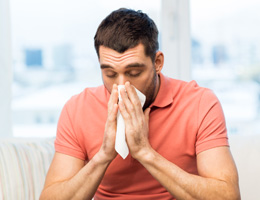
Aug. 7, 2021—It's hardly how you wanted your summer to go: It's August, and you're sniffling. You swear it feels a lot like the start of a nasty cold. But a cold? In summer? Yep, it happens.
On average, adults get about two or three colds annually. And while most colds occur when it's colder out, you can get them at any time of the year—even in the dog days of summer.
Plus, because so many of us have been taking extra precautions to avoid germs this past year, our immune systems may not be as primed to fight off cold viruses.
Summer vs. winter colds
Summer and winter colds tend to have different causes. Winter colds are usually caused by rhinoviruses—the most common type of viral infection in humans, the National Institutes of Health reports. With summer colds, the usual suspects are non-polio enteroviruses, of which there are more than 60 types.
But things are a little different this year. The pandemic interrupted the normal circulation of cold viruses, according to the Centers for Disease Control and Prevention. Now that people are mingling again, rhinoviruses and enteroviruses are both making a comeback. Not to mention the coronavirus is still spreading, which can mimic some cold symptoms.
It all makes for a perfect storm of summer sniffles.
How to avoid a cold
Although summer and winter colds are different, you can take the same steps to prevent them—and other infections—no matter what season it is:
- Wash your hands often. Scrub them with soap and water for about 20 seconds. (Use alcohol-based hand sanitizer if no sink is available.)
- Keep your distance from sick people—especially if they have a fever (often a sign of infection).
- Don't touch your face with unwashed hands.
- Disinfect frequently touched surfaces, like doorknobs and toys.
If you're not sure whether it's a cold or COVID-19, ask your doctor about getting tested.
How to treat a cold
You can't cure a cold. So you have to wait for the virus to run its course—typically a few days to a week. In the meantime, you may feel better if you drink plenty of fluids and get extra rest. You might also try:
- Over-the-counter acetaminophen for a headache or a fever.
- A nasal spray or decongestant for a stuffy nose.
- Ice chips, throat sprays, lozenges or saltwater gargles for a sore throat.
Visit our Colds and Coronavirus health topic centers to learn more about staying healthy this summer.